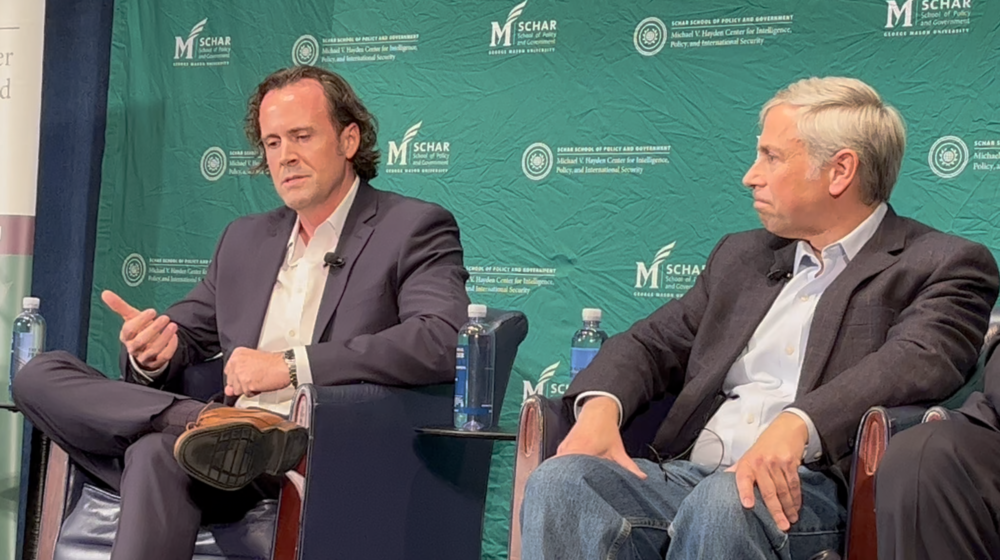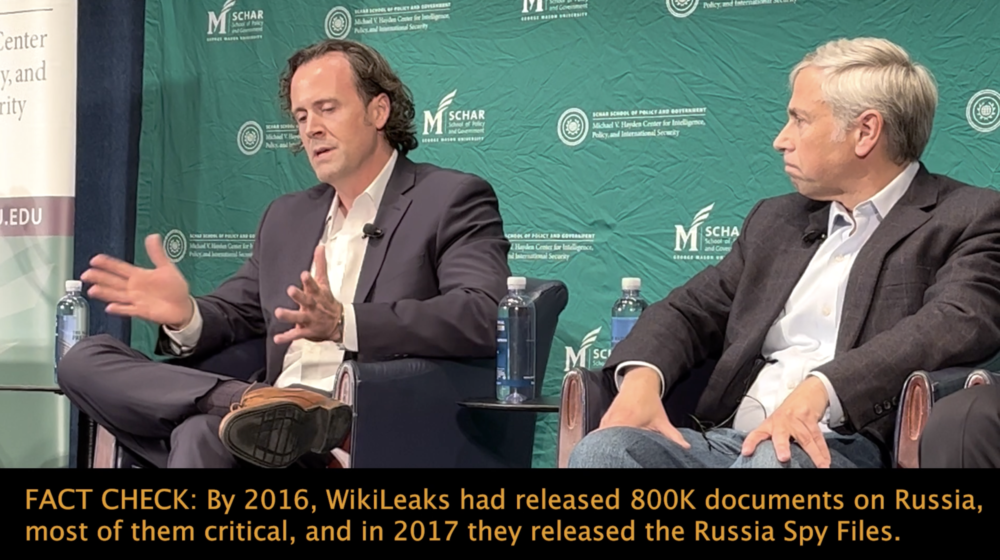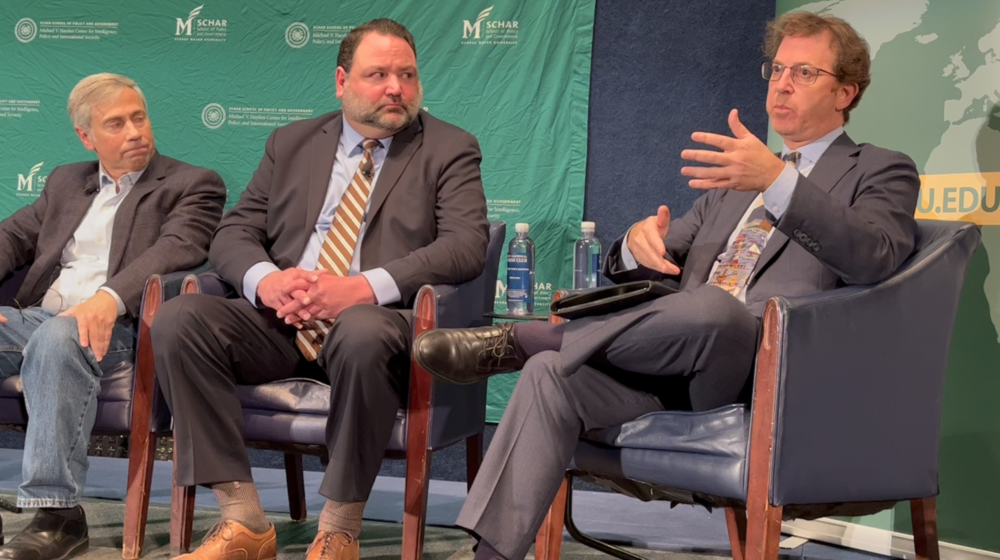Misperception and disinformation overrode the facts of the Assange case at an event organized by the Hayden Center on Monday night in Washington, reports Joe Lauria.
By Joe LAURIA
A week after five major newspapers called on the Biden administration to drop its charges against Julian Assange, the Michael V. Hayden Center for Intelligence, Policy, and International Security countered with an event on Monday intended to push the “intelligence community’s” disinformation about the Assange case.
After it was slammed on Twitter, the program’s initial title, “Julian Assange: Journalist or Techno-Spy?” was changed to the mundane, “The Case of Julian Assange.” It was presented as a debate in the ballroom of the National Press Club in Washington, but the panel seemed stacked against Assange lawyer Barry Pollack.
Larry Pfeiffer, the Hayden Center director and a former Central Intelligence Agency chief of staff, introduced the panelists, asking about the “line between journalism and espionage and when does the line get crossed?” Though the title was changed the purpose was the same, to present Assange as a spy, giving Assange’s U.S. lawyer a chance to respond.
Pfeiffer said the center’s “goal is to have discussions like this that talk about intelligence and the role intelligence plays in our society, in our government, how it informs policy, how it sometimes screws up policy and what do we do then if we need to fix it.”
In other words, trust the intelligence agencies because they have only the best intentions at heart and they fix their “mistakes,” “mistakes” that cost hundreds of thousands of lives, such as in Iraq, and that plotted to take Assange’s life.
On the panel were Holden Triplett, a former F.B.I. agent who was director for counterintelligence on the National Security Council in the Trump White House; Gabe Rottman, director of the Technology and Press Freedom Project at the Reporters’ Committee for Freedom of the Press; Mark Zaid, billed as an attorney dealing with national security law, freedom of speech constitutional claims, and governmental accountability, and Pollack.
‘An Obvious Criminal”
The moderator was a corporate reporter, Sasha Ingber, formerly of National Public Radio, and now of Newsy, a cringe-worthy name that is changing to Scripps News.
Hayden, a former C.I.A. and National Security Agency director, sat in the front row, along with an array of former senior intelligence officials. Hayden ran the NSA from 1999 to 2005 and the C.I.A. from 2006 to 2009. He oversaw the Bush administration’s torture program for a while, as C.I.A. whistleblower John Kiriakou points out in a Consortium News column today. Hayden has been one of a bevy of former senior intelligence officials now commenting on the news on cable networks.
There is no doubt where Hayden stands on Assange, having long identified him as the enemy. In 2010, he called Assange an “obvious criminal” who is “a dangerous combination of arrogance and incompetence.”
That’s OK. We’re still waiting. Sooner or later. https://t.co/kGML40sC9A
— Gen Michael Hayden (@GenMhayden) July 1, 2022
Not Charged With Hacking
Assange’s lawyer Pollack answered the first question of the evening by calmly setting out the facts of the indictment against the WikiLeaks publisher. He explained that Assange was not charged with hacking a government computer, but is accused only of trying to help Chelsea Manning hide her identity to protect his source, an effort he failed at.
Pollack explained that Manning had security clearance to get every document she leaked and therefore had no need to hack a computer or seek Assange’s help to do so. “There are 103 paragraphs in the document charging Julian Assange, exactly three of them have anything to do with any kind of a supposed effort to break a password,” Pollack said. “And the password has nothing to do with getting access to any classified information.”
It can be read in black and white in the Assange indictment, which states that Manning had security clearance access to all the materials she leaked, and that Assange was not charged with hacking to get them.
And yet Triplett, the former F.B.I. official, ignored that and plowed ahead, as though Pollack were not sitting next to him on stage. He repeatedly spoke of Assange “hacking” and that he is “not someone protected under U.S. law.”
“What we have is an organization that calls itself essentially an intelligence agency that is trying to inform the people of the world and has said that they want to hack to bring that information out,” Triplett said. We can stop right there.
First, there are similarities between journalism and espionage in the information gathering phase. But that’s where the similarities end. Journalists make the information they’ve gathered known to the public, while spies keep it secret within their organizations to serve the state. So WikiLeaks cannot be an “intelligence agency that is trying to inform the people of the world.” It’s not what intelligence services do.
Second, Pollack had just explained, rather exhaustively given the event, that the U.S. government has never accused Assange of hacking to bring out information. And yet Triplett is pretending to be quoting WikiLeaks saying “they want to hack” to get information out.
It is a disinformation tactic to ignore facts that undermine one’s message and to pretend as though those facts don’t even exist. Triplett and other purveyors of disinformation are counting on the larger public not having read the 49-page indictment of Assange, which Triplett later told me he had read.
So Triplett knows Pollack was telling the truth. But he knows the target audience — the American public — doesn’t know the facts, but instead has been systematically and repeatedly inculcated with disinformation from government sources through corporate media about the Assange case, such as that he hacked government computers to steal secrets.
Triplett’s immediate deflection from Pollack’s remarks was to say, “I’m not sure what we want to do up here is to litigate the specifics of the case.” But that is precisely what a debate about someone who has been indicted under the Espionage Act would entail, examining the specifics of the case.
Is he a journalist who received and published classified material from a source who stole it, as national security reporters do routinely, or did he steal it himself?
Russia Fixated
Triplett is also explicitly uninterested in proven facts when it comes to Assange’s alleged relationship with Russia. I challenged Triplett after the event, saying that smearing legitimate dissent, or in this case legitimate journalism, as a tool of a hostile foreign power is the oldest trick in most governments’ book.
On the panel Triplett insidiously asked: “If a Russian intelligence agency wanted to create a publisher, what would that look like?”
Speaking with Triplett afterward left no doubt that he and his colleagues are obsessed with Russia. It explains away too much for them. On the panel he said of WikiLeaks:
“I don’t know the specifics but I know what it smells like. It smells like an intelligence operation. This is a typical tactic of how Russian intelligence works. They use proxies… [Assange] had substantial interaction with the GRU. … Is this the kind of person — he’s not an American — that we want to give this power to?”
‘Harming Informants’
A major theme of the event, and of the prosecution of Assange, is that he harmed informants by leaking their names in the documents he published. Pollack cogently laid out the story how Assange had indeed redacted names in what he published and that it was only after two Guardian reporters published the password to the un-redacted files, and after Cryptome.org published the un-redacted cables themselves, that WikiLeaks also published them to help informants get away. (Assange gave the password only to The Guardian’s David Leigh under duress, according to testimony at Assange’s extradition hearing.)
Triplett again ignored Pollack and talked about informants and undercover U.S. agents who were in “substantial danger” because WikiLeaks was happy to publish the un-redacted files. He had no use for Pollack’s explanation of how the un-redacted cables came to be published.
After the event a retired Naval intelligence officer tried to tell me that even though he acknowledged that Assange worked to redact the names, and even though the un-redacted files were made possible by Guardian reporters publishing the password, none of this would have happened had Assange never published any of these documents at all.
It was clear: intelligences agencies, who collectively are probably the most powerful group in U.S. society, have a very good game going and they don’t want it ruined by some “arrogant” and “incompetent” Australian with a conscience.
‘Revealing Crimes’
During questioning, I asked Triplett if he was aware that Gen. Robert Carr had testified at Manning’s court martial (for leaking defense information to WikiLeaks) that there was zero evidence the leaks hard harmed a single U.S. informant.
I also asked Triplett if he was aware that Special Counsel Robert Mueller wrote in a section of his Russiagate report (which was un-redacted after a FOIA request) that he could not charge Assange because he could not prove that Assange was aware that he was dealing with Russian GRU intelligence agents, who Mueller alleges, but has never proven in court, were posing as Gufficer 2.0 to peddle “hacked” DNC emails to WikiLeaks.
In other words, the government admitted that Assange was not guilty of knowingly working with Russian intelligence and have not yet proven that Russia was involved at all. Triplett astonishingly responded, “Yes and yes” to my two questions.
That elicited laughter from the audience and the panel but by admitting that he knew a U.S. Army general testified under oath that WikiLeaks had caused no informants to be harmed and by admitting that the government couldn’t prove Assange was a witting Russian agent, he was admitting that his arguments on stage had essentially collapsed.
Triplett had earlier asked why the U.S. government was concerned about Assange. So I proposed to him in the question period that it just might be because Assange had exposed U.S. government crimes and corruption.
Triplett’s response was that government wrongdoing needed to be exposed, but asked whether Julian Assange was the right person to do it. Before I could answer, “Yes, because major media is too close to government,” the moderator shut down the program.
During the event I was sitting in the front row and when Triplett asked why the U.S. was concerned about Assange, I said under my breath, “Because he revealed their crimes.”
I was startled when a man sitting next to me in a section reserved for retired senior intelligence executives turned to me and angrily growled: “Will you keep your comments to yourself!” After the event I went back to the seat to identify him but his name tag had been removed.
Okay to Kill Rescuers
Zaid, the so-called whistleblower attorney about whom Kiriakou, the C.I.A. whistleblower, wrote in Consortium News in 2019: “Zaid is literally the worst possible choice for any whistleblower in national security,” made two extraordinarily erroneous statements on stage.
First he said that it was “legal” for U.S. government officials to leak classified information to the press. While this is a routine occurrence used to push the U.S. agenda, and while U.S. officials are almost never punished for it, it is not because it is “legal.”
The second astonishing thing Zaid said was that the unarmed private family that stopped to help wounded Iraqis in the Collateral Murder video leaked by Manning were “legally” killed because it is okay to murder rescuers during combat since they are rightfully seen as “the enemy.”
Article 3 of the 1949 Geneva Convention protects “[p]ersons taking no active part in the hostilities, including members of armed forces who have laid down their arms and those placed hors de combat by sickness, wounds, detention, or any other cause” against “violence to life and person, in particular murder of all kinds.”
A 1977 protocol to the Convention “provides that civilians shall enjoy protection against the dangers arising from military operations ‘unless and for such time as they take a direct part in hostilities.’” An unarmed civilian family stopping their van after the firing had apparently stopped to collect a wounded man is hardly taking a “direct part in hostilities.”
That the U.S. pilots in the Collateral Murder video were well aware of the rules of war was shown when we hear a pilot pleading for a wounded man to pick up a weapon near him on the street so he would become a combatant. He does not pick up the weapon and is fired upon anyway.
The entire Hayden Center program can be viewed here:
Photo: Former CIA and NSA director Michael Hayden (left) at Julian Assange event Monday. (Joe Lauria)











